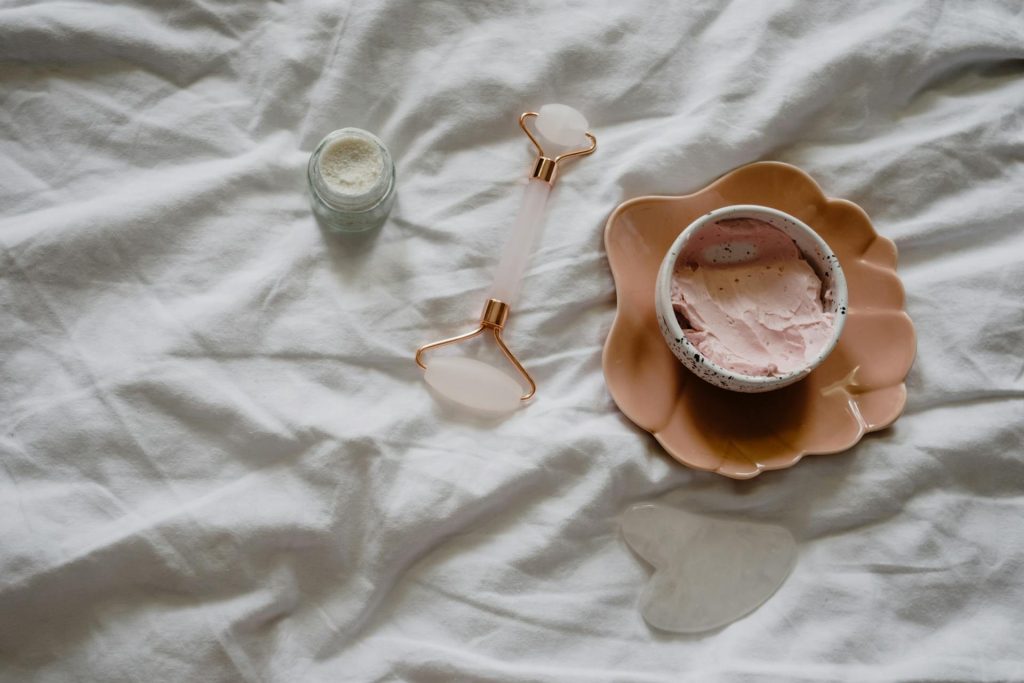Morning skincare routine
There are a few differences between a morning skincare routine and an evening skincare routine. For starters, a morning skincare routine tends to serve a three-fold purpose. Firstly, the skin needs some kind of gentle cleansing. This is because your skin tends to secrete oil during the night. If left untouched, it could end up clogging pores, leading to an acne breakout. If you are applying makeup as well, the oil could also prevent the makeup from adhering to your skin too.
Secondly, your skin needs some kind of hydration in order to stay injury resistant and flexible. On the whole, it is less likely to be damaged if it is supple and strong. So, a good moisturiser will hydrate the skin in order to keep it from drying and retaining daily damage.
As the some is rising, with it comes harmful UV rays too. UV rays can penetrate the skin, potentially causing damage such as sunburn, sunspots, breaking down the skin natural’s elasticity, and even potentially causing sun cancer. Experts recommend that you should get a broad-spectrum SPF sunscreen in order to best protect your skin during the day.
Other things you need to keep in mind are that once you go outside, your skin will also be fighting environmental aggressors, pollution, temperature changes, oxidative stressors, and more. Therefore, your morning skincare routine is essential to providing your skin with the tools it needs to combat all these potential damages.
Therefore, you need to work in harmony with your skin, not against it. As your cells will be in ‘protect mode’ by day by producing lipids to strengthen your skin barrier, it makes sense to tailor your routine to fit it. So, when it comes to creating a morning skincare routine, you should be looking to use antioxidant-rich serums, barrier-strengthening fatty acids, as well as free-radical-fighting vitamin-C skincare. Products that may compromise the skin barrier should be better used at night time.
You also need to be considerate regarding your cleansing routine in the morning too. So, you should start with the gentlest of refreshes after your skin’s busy night of repairing itself. The cleanser you pick should be gentle, hydrating and preserves the epidermis, in addition to removing all the build-up and gunk that has accumulated overnight.
Evening skincare routine
However, at the end of the day, you may find that your skin has slightly different needs when compared to first waking up in the morning. That being said, you will likely still need a good and effective cleanser that can remove gunk such as makeup, oil, and dirt that has built up over the day. However, at night time, your skin is going to stay relatively protected for up to seven to ten hours. So, this is a fantastic time to start applying targeted skin treatment and heavier moisturisers. The reason behind this is that they will stay in contact with your skin for longer and penetrate deeper, meaning you will be more likely to feel their positive effects.
As such, a carefully thought-out skincare routine can charge up your skin’s nighty revitalising rituals. If you have ever noticed how great your skin looks after a good night’s sleep, well, that is because the skin’s overall regeneration is at its best during the night. So, regenerating and healing proteins such as collagen, elastin and retinol make for natural bedfellows.
For instance, a retinol can boost the production of protein to assist with your skin density and wrinkles. This is something that already happens overnight, but you can benefit a lot more from retinol when it is applied at the right time for your skin to be making proteins. A few experts say that you should only ask the skin to do one thing at a time and do it well. As such, according to them, people should not be swayed by products claiming to do everything at once. This is because the skin is receiving too many messages and cannot benefit from the products. For example, while vitamin-C skincare is not a problem if you use it at night, it is a lot more beneficial during the daytime. This is because, during the day, your skin is already in protect mode. So, all in all, you should definitely support your skin in what it is already doing.
Additionally, when it becomes nighttime, your skin tends to move away from producing lipids, which may end up drying out the skin. The PH of your skin also rises, and the epidermal barrier weakens, while sebum production reduces, and blood flow increases. So, an optimal skincare strategy needs to take into account all these cyclical changes. So, it is best that you look for ultra-hydrating products to lock in moisture when you sleep. It can also counteract any dryness that is triggered by retinol use.

